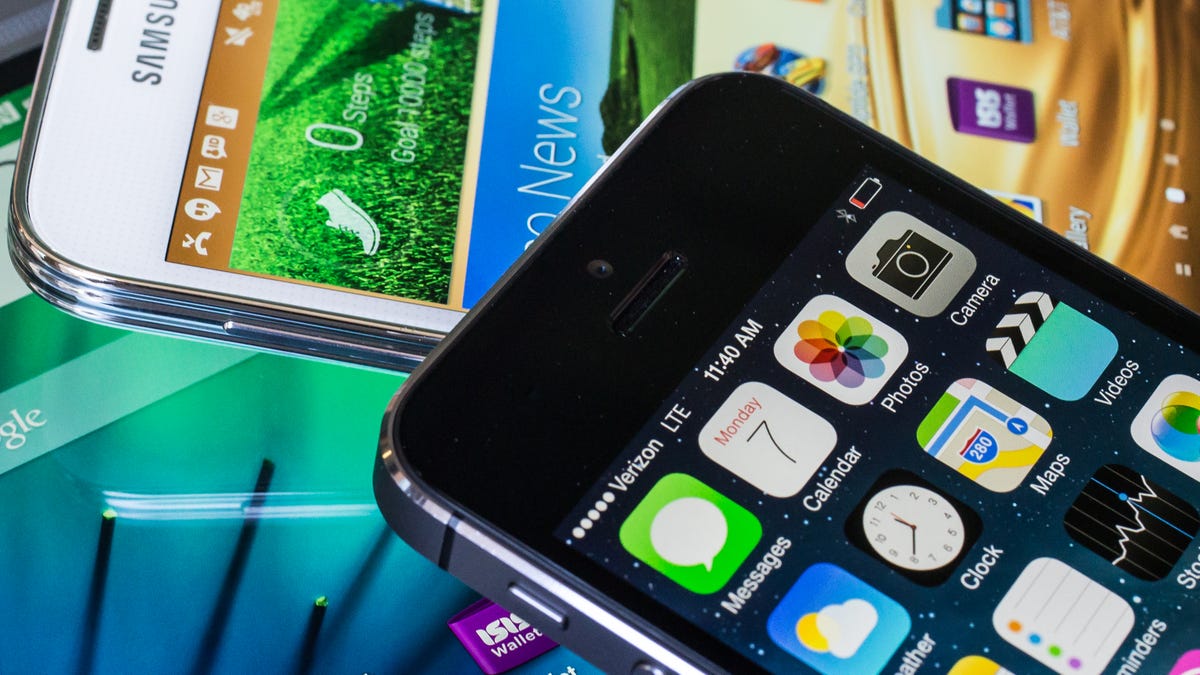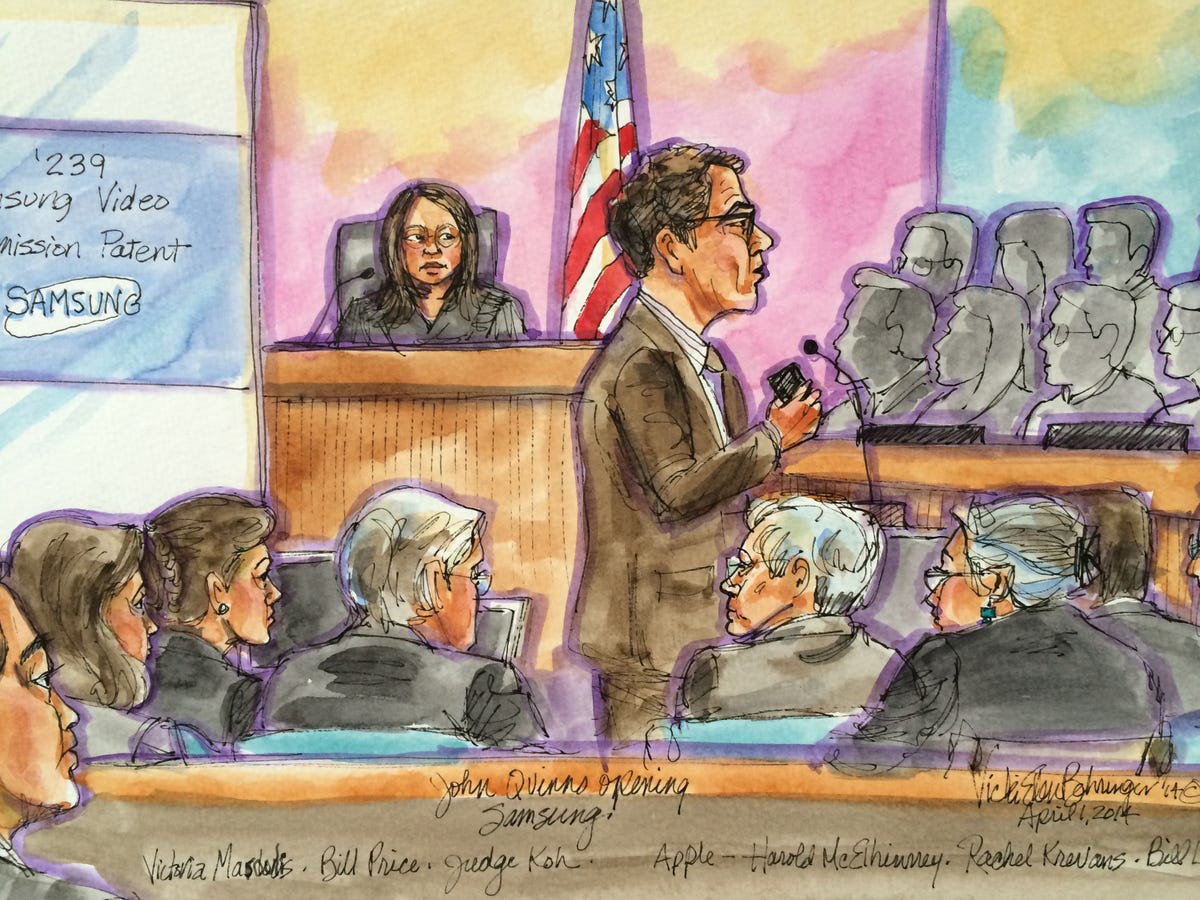
Josh Miller/CNET
SAN JOSE, Calif. — An Apple study to determine whether people would buy phones to get certain Apple patented features is similar to asking people to choose a car based on its cup holders, an expert hired by Samsung testified Friday.
David Reibstein, chaired professor of marketing at the University of Pennsylvania’s Wharton School of Business, on Friday refuted Apple expert John Hauser’s testimony from earlier this month. Hauser, the Kirin professor of marketing at the MIT Sloan School of Management, conducted a conjoint study that determined Apple’s patented features made Samsung’s devices more appealing.
However, Reibstein said Hauser’s study was flawed because it didn’t take into account major factors such as phone brand, it generated data that couldn’t be relied upon, and it led to invalid results.
“There were several [factors that drove consumers’ phone purchasing decisions],” Reibstein said. “None of them included the … patented features that are the focal point in this case.”
Related links
- Apple v. Samsung: All you need to know about latest patent trial (FAQ)
- Tech novices set to determine the fate of Apple v. Samsung
- Apple: Samsung patent case is not about Google
- Apple: Samsung purposely copied iPhone after suffering ‘crisis of design’
- Apple expert: iPhone-like features boosted Samsung phone sales
Almost two years after Apple and Samsung faced off in a messy patent dispute, the smartphone and tablet rivals have returned to the same San Jose, Calif., courtroom to argue once again over patents before Federal Judge Lucy Koh. Apple is arguing that Samsung infringed on five of its patents for the iPhone, its biggest moneymaker, and that Apple is due $2 billion for that infringement. Samsung wants about $7 million from Apple for infringing two of its software patents.
While the companies are asking for damages, the case is about more than money. What’s really at stake is the market for mobile devices. Apple now gets two-thirds of it sales from the iPhone and iPad, South Korea-based Samsung is the world’s largest maker of smartphones, and both want to keep dominating the market. So far, Apple is ahead when it comes to litigation in the US. Samsung has been ordered to pay the company about $930 million in damages.
Most Samsung features that Apple says infringe are items that are a part of Android, Google’s mobile operating system that powers Samsung’s devices. All patents except one, called “slide to unlock,” are built into Android. Apple has argued the patent-infringement trial has nothing to do with Android. However, Samsung argues that Apple’s suit is an and that Google had invented certain features before Apple patented them.
Apple expert Hauser surveyed hundreds of Samsung device users — 507 for phones and 459 for tablets — to measure the percentage of consumers who would buy devices with certain features. He then used those results to determine how much people would pay for Apple’s patented features. Hauser is key to Apple’s argument that it deserves about $2 billion in damages for Samsung’s alleged infringement.
Reibstein on Friday, however, said Hauser’s study is “not useful for estimating market outcomes because major features are omitted.” Hauser didn’t ask survey participants about how important branding, operating system, battery life, and other features are for buying decisions, Reibstein said. Samsung has argued that brand and operating system are two of the most important factors consumers consider before purchasing a device.
Apple v. Samsung 2014: The gadgets in question






“You’re trying to predict what it is people will buy, and if you just focus on smaller aspects and a couple major factors, you’re going to miss what would drive sales and why people would buy your products,” Reibstein said.
A similar study could be used to see what car people would purchase by asking what cup holder they prefer, rather than ever mentioning a car’s brand, he said.
Apple, meanwhile, quizzed Reibstein on whether he ever talked to anyone at Samsung to find out the value the Korean company placed on the accused features or performed his own conjoint study. Reibstein said he didn’t talk to anyone at Samsung, and he said another expert hired by Samsung, NYU Stern School of Business professor Tulin Erdem, performed such analysis.
Erdem took the stand Friday with less than an hour left in the session. She testified she conducted her own studies, using eye tracking, to determine what devices consumers would buy. Erdem didn’t include Apple’s patented features because she said it wouldn’t be realistic based on what’s typical for device comparison sites. And she concluded that things such as the secondary camera didn’t boost desire for the products.
“As a group, the minor things didn’t drive demand,” she said. “It was the major things that drive demand.”
Apple, however, sought to raise doubts about Erdem’s findings. It pointed out that she concluded that factors such as the processors, the use of an on-screen QWERTY keyboard, and GPS, didn’t drive phone sales. But Reibstein earlier Friday criticized Hauser’s study for not including those same features, an Apple attorney pointed out.
Other testimony Friday included the deposition of former Microsoft software engineer Gary Hall and Jeffrey Chase, a professor of computer science at Duke. Hall discussed Windows Mobile 5 and the use of ActiveSync, which Samsung used to show that technology existed for background syncing before Apple’s ‘414 patent. Chase then testified that the background syncing used on Samsung devices is different from that covered by Apple’s patent.
Samsung also questioned Nick DiCarlo, vice president of product planning and product marketing for Samsung Telecommunications America, about how quickly the company can roll out changes. He noted it took one to six days, depending on the carrier, to push an update to quicksearch on the Galaxy S3 following an Apple injunction.


Vicki Behringer
Along with the live witnesses, Samsung presented deposition testimony from several Apple executives, including marketing chief Phil Schiller and Sarah Chandler, Apple director of operations product development/procurement. The testimony largely revolved around ease of use and Samsung’s efforts to show many features go into making devices simple.
Samsung attorney John Quinn read the deposition testimony to the jury rather than showing videos in an effort to save time. Quinn earlier Friday asked Koh for more time — even just an hour and a half — to present its case. He noted the company would rest its case a week from Friday with only 80 minutes of evidence expected that day. Apple argued against the request, saying it had to manage its own time. Koh unsurprisingly denied the request.
In the case, Apple and Samsung have accused each other of copying features used in their popular smartphones and tablets, and the jury will have to decide who actually infringed and how much money is due. This trial involves different patents and newer devices than the ones disputed at trial in August 2012 and in a damages retrial in November 2013. For instance, the new trial involves the iPhone 5 , released in September 2012, and Samsung’s Galaxy S3 , which also debuted in 2012.
The latest trial kicked off March 31 with jury selection. The following day featured opening arguments and testimony by Schiller, Apple’s head of marketing. Other witnesses who have testified include Greg Christie, an Apple engineer who invented the slide-to-unlock iPhone feature; Thomas Deniau, a France-based Apple engineer who helped develop the company’s quick link technology; and Justin Denison, chief strategy officer of Samsung Telecommunications America. Denison’s testimony came via a deposition video.
See also
- Samsung: Apple’s case ‘is an attack on Android’
- Samsung: Apple ‘vastly overstated’ scope of patents
- Apple’s Phil Schiller: Samsung’s copying makes people ‘question’ our innovation
- Apple: Samsung made ‘false statements’ during opening argument
- Apple rests case vs. Samsung after expert makes pitch on damages
Apple experts who took the stand over the past couple of weeks included Andrew Cockburn, a professor of computer science and software engineering at the University of Canterbury, New Zealand; Todd Mowry, a professor of computer science at Carnegie Mellon University; and Alex Snoeren, a professor of computer science and engineering at the University of California, San Diego.
Samsung, which launched its defense April 11 after Apple rested its case, called several Google engineers to the stand to testify about the early days of Android and technology they created before Apple received its patents. Hiroshi Lockheimer, Google vice president of engineering for Android, said his company never copied iPhone features for Android. Other Google Android engineers, Bjorn Bringert and Dianne Hackborn, also testified about features of the operating system.
High-ranking Samsung executives, including former Samsung Telecommunications America CEO Dale Sohn and STA Chief Marketing Officer Todd Pendleton, also took the stand during the weeks-long trial. The two executives testified about Samsung’s marketing push for the Galaxy S2 and other devices, saying a shift in the Korean company’s sales and marketing efforts — not copying Apple — boosted its position in the smartphone market.
The past couple of days of testimony have largely been experts hired by Samsung to dispute the validity of Apple’s patents and to argue that Samsung didn’t infringe. The experts include Martin Rinard, an MIT professor of computer science; Saul Greenberg, a professor of human computer interaction at the University of Calgary in Canada; Kevin Jeffay, professor of computer science at the University of North Carolina, Chapel Hill; and Daniel Wigdor, a computer science professor at the University of Toronto.
There are seven patents at issue in the latest case — five held by Apple and two by Samsung. Apple has accused Samsung of infringing US patents Nos. 5,946,647; 6,847,959; 7,761,414; 8,046,721; and 8,074,172. All relate to software features, such as “quick links” for ‘647, universal search for ‘959, background syncing for ‘414, slide-to-unlock for ‘721, and automatic word correction for ‘172. Overall, Apple argues that the patents enable ease of use and make a user interface more engaging.
Samsung, meanwhile, has accused Apple of infringing US patents Nos. 6,226,449 and 5,579,239. The ‘449 patent, which Samsung purchased from Hitachi, involves camera and folder organization functionality. The ‘239 patent, which Samsung also acquired, covers video transmission functionality and could have implications for Apple’s use of FaceTime.
The Samsung gadgets that Apple says infringe are the Admire, Galaxy Nexus , Galaxy Note , Galaxy Note 2, Galaxy S II, Galaxy SII Epic 4G Touch, Galaxy SII Skyrocket, Galaxy S3, Galaxy Tab 2 10.1, and the Stratosphere. Samsung, meanwhile, says the iPhone 4 , iPhone 4S, iPhone 5, iPad 2 , iPad 3, iPad 4, iPad Mini, iPod Touch (fifth generation) and iPod Touch (fourth generation) all infringe.
The arguments by Apple and Samsung in the latest case should finish by the end of April. Court will be in session three days each week — Mondays, Tuesdays, and Fridays — though the jury will deliberate every business day until it has reached a verdict. Koh noted closing arguments likely will take place April 28.
Updated at 3:55 and 4:30 p.m. PT with details of other testimony.
Up close and personal with the Samsung Galaxy S3 (pictures)









